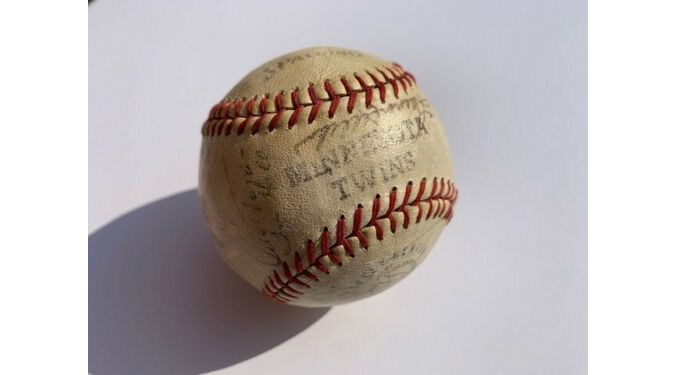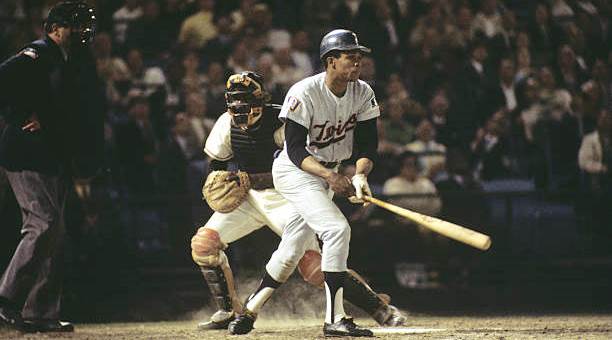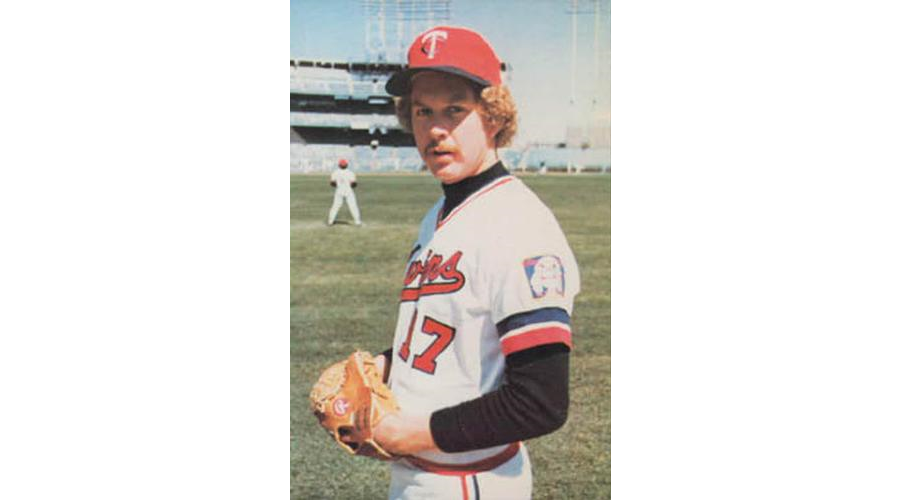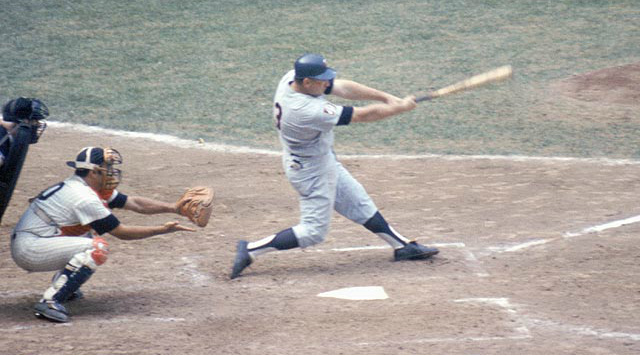MINNESOTA 8, OAKLAND 2 IN OAKLAND
Date: Saturday, April 11.
Batting stars: Rod Carew was 2-for-4 with a hit-by-pitch. Cesar Tovar was 2-for-5 with a stolen base and two runs.
Pitching star: Jim Kaat pitched a complete game, giving up two runs on seven hits and one walk and striking out seven.
Opposition stars: Sal Bando was 1-for-3 with a home run (his second) and a walk. Reggie Jackson was 1-for-4 with a home run. Jim Roland pitched 2.2 innings, giving up an unearned run on two hits and a walk and striking out two. Roberto Rodriguez pitched two perfect innings and struck out one.
The game: The Twins again scored early and often. Tovar led off with a single and stole second. He was still there with two out, but then a circus broke out. Harmon Killebrew reached on an error, scoring Tovar. Rich Reese reached on an error, putting men on first and second. Then came a passed ball-plus-error, scoring Killebrew to put the Twins up 2-0.
In the second Leo Cardenas drew a one-out walk, Tovar hit a two-out single, Carew was hit by a pitch to load the bases, and Tony Oliva delivered a two-run single to make it 4-0. In the third, Jim Holt singled and George Mitterwald walked. Leo Cardenas bunted to move the runners to second and third for Kaat. An unusual strategy, bunting in front of the pitcher, but it worked as Kaat hit a two-run single to make it 6-0. Carew hit a two-run single to increase the lead to 7-0. The Twins added one more in the fifth when Cardenas singled, Kaat reached on a bunt-plus-error to put men on second and third, and a ground out brought the run home.
Meanwhile, the Athletics did not advance a man past first base through five innings. Singles by Bob Johnson and Bert Campaneris opened the sixth, but Rick Monday hit into a double play and Felipe Alou struck out to end the inning. Oakland finally got on the board when Bando homered with one out in the seventh. They got another run in the ninth when Jackson hit a two-out homer. But that was all they got, and it ended 8-2.
W: Kaat (1-0).
L: Blue Moon Odom (1-1).
S: None.
Notes: Holt was in left field in place of Brant Alyea. Frank Quilici replaced Killebrew at third base in the seventh.
Carew was batting .455. Mitterwald was 0-for-3 and was batting .417. Holt was 1-for-4 and was batting .400. Oliva was 1-for-5 and was batting .400. Quilici was 0-for-1 and was batting .400. Kaat was 1-for-3 and was batting .333. Killebrew was 0-for-3 and was batting .300. I love having fun with early-season batting averages.
Rich Reese was 0-for-3 and was batting .167.
Kaat had an ERA of 2.00.
I think I forgot to put the dates on the first couple of games, but the Twins had been playing every other day. Their first two games were on April 7 and 9. I don't know if that was planned off days, rainouts, or one of each.
I don't remember, and I don't want to look ahead far enough to check, but I suspect we'll find that Alyea and Holt were platooned, at least to an extent.
Roland, of course, is a former Twin.
Roberto Rodriguez came up with the Athletics in 1967, when they were still in Kansas City. He went 1-1, 3.57 in 40.1 innings. He then went to AAA for two seasons and did not pitch very well. He started 1970 with Oakland and posted a 2.92 ERA and a 1.05 WHIP in 12.1 innings. The Athletics were apparently not impressed, as they sent him to San Diego in late May "as part of a conditional deal". He put up a 6.61 ERA and a 1.90 WHIP in 16.1 innings there, and in late June the Padres sent him back to Oakland "as part of a conditional deal", meaning he was essentially traded for himself. That same day, though, the Athletics traded him to the Cubs for Don Young. He wasn't very good there either, posting a 5.82 ERA and a 1.50 WHIP in 43.1 innings. He pitched in AAA through 1974 and then went to the Mexican League for 1975, and then was done with organized ball. He apparently went to the Venezuelan Winter League for several years, though, and pitched very well. He was inducted into the Venezuelan Hall of Fame in 2011. He was an instructor at a baseball academy in Nicaragua for several years before passing away from a heart attack in 2012.
Record: The Twins were 3-0, tied for first based on percentages, but a half game behind California.




